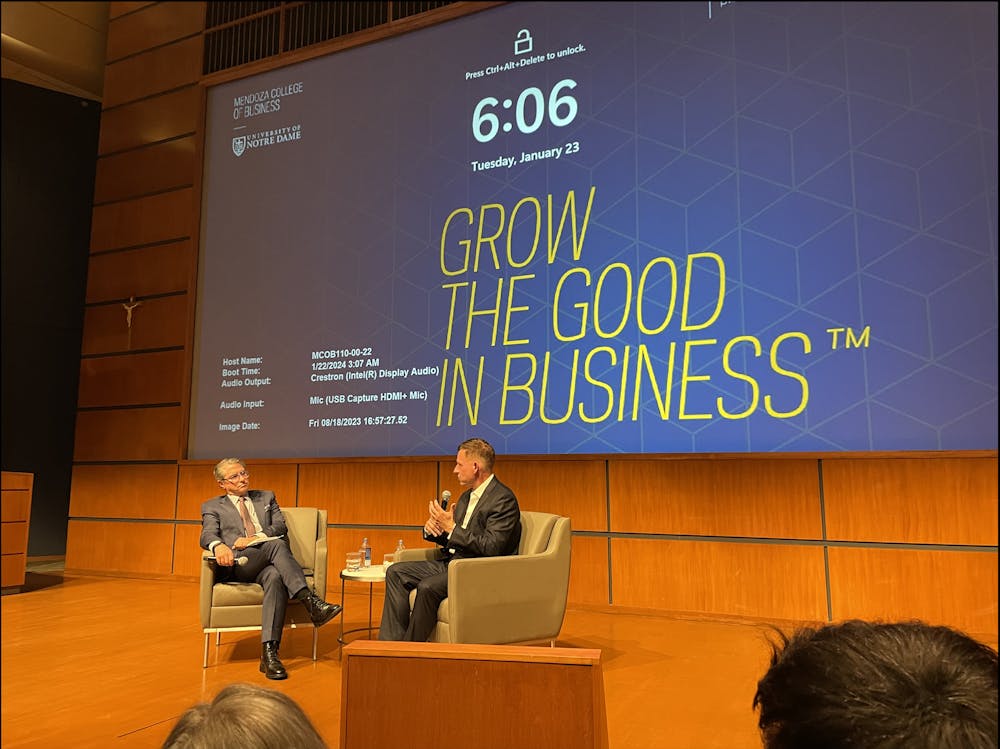Billionaire investor and entrepreneur Peter Thiel took the stage of a packed Jordan Auditorium Tuesday night for a lecture and public conversation with political science professor Patrick Deneen. The event was hosted as part of Deneen’s seminar on “Liberalism and Its Discontents,” which Deneen analogized to the drag performance held on campus last semester. The event was not co-sponsored by any institutes or departments on campus, and Deneen said he did not ask.
“I just didn't want to run into the likely concerns that are gonna be raised by the institutions, which answer ultimately to, among other things, the DEI apparatus and the University,” he told The Observer last week.
Deneen introduced Thiel as someone “best known as the co-founder of Paypal, Palantir Technologies, Founders Fund and, for those of you who have watched ‘The Social Network,’ the first outside investor of The Facebook, later known as Facebook and today Meta.”
He referred to the fact that Thiel came to Notre Dame as ice and snow covered much of campus. “As you doubtless surmise, Peter Thiel is a rather extraordinary individual. And yet as I was preparing my introduction, I did have a pause to question just how smart he is, given that he elected of his own choice to come to South Bend during the third week of January,” Deneen said.
Thiel began his lecture by reflecting on the 1995 book that shared a title with the event, “The Diversity Myth.” Thiel co-authored the book with David O. Sacks, the investor and his successor as editor-in-chief of the conservative student publication The Stanford Review. The book discussed the “politics of intolerance at Stanford,” and drew on Thiel’s experience as a student.
“I was involved in all these campus wars, culture wars,” Thiel said. “I’ll do a little bit of a retrospective tonight on some of the things I got right, which is everything.”
Throughout his talk, Thiel outlined major “distractions,” particularly arguing that “the diversity and cultural war debates kind of distract us from the real things.” He argued that voices on the right had not succeeded in these tussles. “Somehow the conservatives or libertarians [who] like myself were making these arguments basically lost. The fact that we had logic on our side, that the argument might have been right didn't somehow translate at all.”
Thiel engaged Deneen’s thesis about the failure of political liberalism in his lecture. “It’s always a question. What took so long for liberalism to fail, and there have always been these contradictions, and they've been around for 300 years and why wasn't it obvious?” he posed. “I think there are many answers. It took a while for all these contradictions to really crystallize as they have today. But certainly, as long as you had a healthy progressing science and technology, as long as this one dimension was getting better and better, that covered up for all sorts of places where maybe things were not progressing.”
Thiel argued there’s a culture of suppression that undermines truth. “I always have this shortcut: where if there are things that are taboo, things you’re not even allowed to say, my shortcut is it’s probably just true,” he said.
He discussed the fervor of advocates for “wokeness” as religious. “If you think of wokeness as a form of Puritanism run amok or something like that, where the self-proclaimed saints are using it as a stick to beat everyone else,” he said.
Thiel closed his remarks with a discussion of the term political correctness, which he said had already been adopted by conservatives in the 1990s as an epithet, used by liberals to describe themselves in the 1970s and it “just meant you were a communist.”
He ended with the line “This is you know, a simplification of sorts, I think it would not be altogether unhealthy that if every time you hear the word DEI, you just think CCP.”
Thiel’s spoken remarks were followed by a conversation with Deneen, who sought to reconcile Deneen’s critiques of the woke, both those who were viewed as cynical deflectors from the real issues, and the idea of religiously fervent true believers.
Thiel argued it was a combined coalition. “If you think of the woke DEI whole coalition as a combination of true laborers and useful idiots, and, you know, from the capitalists or people who are in some corrupt racket, that's probably a far more powerful coalition,” he said.
Thiel discussed Christianity and the influence of his teacher the French Catholic philosopher René Girard. When Deneen mentioned that Thiel was “evolving in lots of ways,” perhaps to Catholicism, Thiel responded “my two word rebuttal of Roman Catholicism is Pope Francis.” Deneen did the sign of the cross in response.










